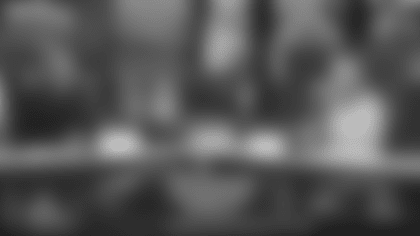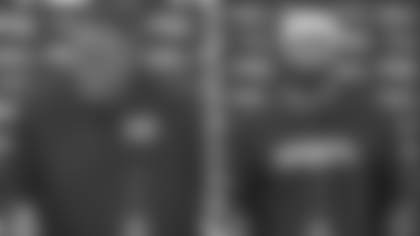[

]()
**BB:** What do you have today?
**Q: Jeremy Shockey has drawn some comparisons to Mark Bavaro. Do you see some similarities?
BB:** Well they are both pretty good players. They both played for the Giants, so there are some comparisons. [Laughter]
**Q: [Laughter] Beyond that.
BB:** I think Mark was the best blocking tight end that I have seen. I know the outside linebackers that I coached at that point felt like he was the toughest guy they had to go against. Every tight end was a little bit of a step below Bavaro in terms of blocking. When we played Philadelphia all those years and Washington, those teams played a lot of over fronts so the over ends, which was usually Reggie [White] from Philadelphia and then Charles Mann and Dexter Manley from the Redskins. They were a lot to handle but Mark just blocked them and it wasn't any big thing. There wasn't any big scheme of, 'We have to do this because of White or because of Mann or because of Manely.' He just blocked them. Clyde Simmons. I think he is really an outstanding blocker. I think Shockey is a good blocker. He is a big body and he gets on top of people, covers them up and it is hard for those guys to get around him. The guys that are bigger than him, just like with Bavaro, they have enough quickness to be able to get position on those big guys and block them that way. They are both good in the passing game. Shockey is a natural receiver. There was a time when in 1985 to 1990, when Mark was there, people weren't using tight ends offensively the way they use them now where they split them out and throw them screens where a guy catches a lot of balls, those kind of plays. It was much more of the conventional passing game that Mark was involved in, down field and running in routes and corner routes and post patterns and stuff like that. I am sure that his numbers aren't going to be what some of the tight ends numbers are showing up to be today in the style of offense he played in. In terms of them both being big, physical, good athletes that can run, that can block on the line of scrimmage, block in pass protection and make plays in the passing game, I would say there are a lot of similarities.
**Q: What made you place the call to Pepper Johnson back in 2000?
BB:** Well, he called me. He called me and wanted to get into coaching. He wanted to come training camp. I thought that was good. So he came to camp and really things went so well in training camp because as I told him at that point, 'Let's not make any long term commitments here because you might not like coaching, you might not like working for me, you might not like a lot of things.' I like him as a player but I didn't know how the coaching thing was going to work. You just don't know. By the end of training camp I think it was pretty clear to both of us that things were going well and he was making a real good contribution on the field with our players. Actually, at that point and time he probably knew our defense better than the coaches did just because he had been in it longer and had actually run it on the field. He proved to be a very valuable person to have in training camp in 2000 and then it just kept going from there.
**Q: He brings a different energy level to the team.
BB:** Yes. I think we have a lot of different styles of coaching on our staff and I think that is good. I think that is a good blend. Some guys they have different personalities and different styles but I think it is a good blend together. I think Pepper certainly adds a level of energy and enthusiasm as a player, a very good player in this system. He can bring a lot to not just the defensive side of the ball, but particularly the defensive side of the ball, he has been through it, he has been successful with it and he knows how to do it. He's done it out there on there on the field. That is a perspective that not everybody else has. Other people have other perspectives, which are good too.
**Q: He has followed you around, with Cleveland and then with the Jets later. Did you guys have a special chemistry after making those moves together?
BB:** Yes. When we drafted Pepper in 1986, we had a pretty good group of linebackers. It was a tough lineup to break into. I remember the first game that he really got a lot of playing time was the St. Louis game and he had a couple of sacks in that game and made a couple of real nice plays. That was near the end of the season and then he got more and more playing time into the Super Bowl. He really was a good player for us. He could do it all. He could play the strong side, he could play the weak side and he actually played outside in some games that Lawrence [Taylor] missed. The other guys were good too, but Pepper had a level of versatility and had a leadership and a presence about him that was special. It was a good blend. He fits in well with everybody. He certainly fit in well with that group. When I was in Cleveland and the Giants released him, I thought that he would be a good addition for us and he was. He was a team captain there as he was at Ohio State. If he wasn't the only, he is one of the very few two-time captains at Ohio State and that was a lot of football players there. I think that speaks to his leadership and the respect that he has on the field. With the Jets it was a new program and bringing in a guy who knew how to do it and knew how to do what we were doing.
**Q: Does he still have the whole scout team thing going?
BB:** Sure. He does a great job with it. The players take a lot of proud in that scout team. They give the offensive guys a good look. Pepper does as god a job with that scout team as anybody that I have been around. He has them playing well and doing what they are supposed to do and they have a lot of fun doing it. He does a nice job.
**Q: Any changes to the guys who are hurt, running backs specifically?
BB:** Antowain [Smith] and Kevin [Faulk] haven't done much this week. We will see what they can do today. Hopefully, they will be a little bit ahead of where they were the last couple of days. Fred [McCrary] has been out there all week. He has missed a little bit of time but he is getting back into it. I think a lot of these are going to come right down to the wire. There are several guys that aren't going to be 100 percent that will play. We will just have to make those decisions closer to game time.
**Q: This might be a silly question.
BB:** It's not.
**Q: [Laughter] When you have a home a game is it easier to make game time decision because you don't have to make that travel decision on guys?
BB:** I think the only time we wouldn't travel somebody is if we felt like that would really just set them back, just being in the air and maybe if there is a swelling issue or that kind of thing and we just felt like there is pretty much no chance on this one, it probably wouldn't be worth it. Especially if it was a real long flight like a cross-country flight or something like that. I can think of several cases where we have put them in those boots and iced them the whole plane trip and all of that and just treating them literally right up the morning of the game. You never know sometimes when they are going to turn the corner. Sometimes it happens on Wednesday, sometimes it is Thursday and sometimes it is Saturday. I think that if the guy has a chance we will keep it alive until right down to the wire.
**Q: I would imagine you can't have too many game time decisions? Like you can't have seven game time decisions.
BB:** No, but I would say every week there will be one or two and we will be talking about it right there when we are filling out the inactive list and say, 'Okay, here are our options. Here are the things that we talked about last night. This is basically the way we talked about it and here is what we are going to do,' or 'Well, we talked about it this way, but now it is not quite that way. This guy looks a little better than we thought he would,' and that type of thing. Sometimes you get to the game and the conditions of the game may change it a little bit too. If it looks like one of those days where maybe it is going to be hard to throw the ball and you think it is going to be more of a running game because of the elements then maybe you make a decision that might strengthen you in the running game rather than in the passing game or vice versa. Each one is a little bit different. You take them into consideration and make the decision but I would say that there is at least one of those almost every week.
**Q: If you have seven guys that are game time decisions, does that means that there are seven layers of contingencies?
BB:** I don't know that there are seven game time decisions. But now there are probably a half-dozen. As a Friday, it might clear up a little bit in the next 36 hours but until we go out there and see really what some of those guys can do today, whether they either can't practice today or whether they are going to be able to practice today and look like they are getting pretty close, it might look different three or four hours from now.
**Q: How is [Mike] Cloud looking in his second week of practice? He is probably getting a lot more reps with the other guys not working.
BB:** He is, he has gotten a lot more reps this week than he did last week with Antowain and Kevin being out. I think for him that is good. It's not good for the guys that aren't getting them but it is good for him. That may enable him to get a few more snaps in the game.
**Q: Does he look pretty sharp?
BB:** Yes, it has been okay.
**Q: He is not down to two yards per carry? [Laughter]
BB:** [Laughter] Well, I don't know. Let's hope we haven't coached him into that.
**Q: You talked about Tully [Banta-Cain], Kenyatta [Jones], Stephen [Neal] and Chas [Gessner]. How are they doing?
BB:** They are doing fine. I think that they are getting close. They have been doing some work on their own. Hopefully when we get an opportunity to work with them, they are going to have to show up pretty quick and show what they can do and make their move one way or the other.
**Q: Is Tully in the same group like Kenyatta because you said he was pretty close?
BB:** I think Tully is close. Tully has been rehabbing since June so about three months. He should be all right.
**Q: Did he have surgery?
BB:** Gee, I can't remember. [Laughter] I can't remember if he did or not.
**Q: [Laughter] With all of the injuries throughout the league is there any rational explanation why all of a sudden are getting hurt? Are people just getting too big or maybe just running too fast these days?
BB:** I don't know if they were any bigger than they were last year. I don't know. I don't have an explanation.
**Q: Is there one coach that you would categorize as the toughest you coached against?
BB:** Toughest? From the standpoint of…?
**Q: Just preparing for that team.
Q: Like a street fight? [Laughter]
BB:** [Laughter] A guy I would least like to tangle with?
BB: Boy there are a lot of them. It would be hard to single out one guy. Back when I was with the Giants, every week it was [Tom] Landry, he was calling the offense, it was [Joe] Gibbs, it was Bill Walsh. You can go right down the line. There were a lot of guys who were hall of fame type coaches calling plays and running offenses on the other side of the ball that was pretty challenging. There are a lot of great coaches in the league now, especially on the offensive side of the ball, not that there aren't good coaches on the defensive side of the ball, I am not saying that but there are some very high profile offensive coaches. As I have been involved in the offense the last few years, most of my time has been working against the offensive coaches, rather than the defensive. But I have done more of that lately and there are some teams that really present you with a lot of problems defensively as well starting with a guy like [Jeff] Fisher. I think it would be hard to single out one guy. We have problems every week.
**Q: How have the other teams that have faced the Giants defended Shockey? It just seems like he comes up mismatched.
BB:** Yeah, he does. It starts with where is he because he is not always in the same place. Sometimes he lines up at tight end. Sometimes he is the off the line tight end that moves. Sometimes he is in the backfield and sometimes he is flexed out either in the slot like where a tight end would be flexed or sometimes he is in the outside position where a receiver would normally be. It is hard to say, here is how we are going to cover them when you are not even sure exactly where he is. Because you could just put your coverage on him but then that means you have a million other possibilities without the other nine or ten guys that have to line up. That is tough.
**Q: How has it looked against those other teams?
BB:** To answer your question, I would say that a lot of teams, Miami, they kind of do what they do. The Rams, they kind of do what they do.
**Q: Could you break that down just a little bit more?
BB:** They run the defenses that they run. They are not the type of team that is going to come in and…
**Q: So is that a linebacker on him? Or a safety on him?
BB:** I mean like take the Rams. The Rams play a lot of the coverage that Tampa plays, the two-deep coverage that Lovie Smith and Monte Kiffin from Tampa [run]. That is what they do. They do a good job of it. Not that they don't do other things, but that is one of the main things that they play. The Redskins, you saw their style of defense and they do a pretty fair amount of blitzing. They played down in the box with the safeties and [Jessie] Armstead and [LaVar] Arrington and had different guys on them. I guess what I would say is because of the multiple positions that he plays and because of the multiple other offensive weapons that they have, I think the way that most teams have played has been more of an awareness. You have to know where he is and the guys who are in that area have to pay a lot more attention to him than they would normally pay as opposed to watching a team play a coverage and say, 'Oh, this is a coverage that they put in to take care of Shockey.' I am seeing less of that and I would say I have been seeing more of they kind of run what they normally run but they are paying a lot more attention to him. The linebackers are staying on him longer on the line of scrimmage. The defensive backs are getting up to him closer, they are not letting him try to create as much space. If he is split in a wider position that the linebackers and the safeties are more conscience of dropping to them in that spot and not giving them as much space to go ahead and run his routes. I would say it is more of that than it is, 'Well here is the defense that the Rams had for Shockey and here is the defense that the Redskins had for Shockey. Here is the defense that the Cowboys ran against Shockey.' I am not seeing as much of that. I think it is more of an awareness, if that makes any sense.
**Q: Have you seen the size thing? When you have no one who is 6'5?
BB:** I don't think anybody does. I mean, who has got a guy who is 6'5, 260 that runs a 4.6 on defense? Probably a defensive end if you have them and you don't want him in coverage anyway. That is always going to be an issue. Going back to the Keith Jackson's or the [Shannon] Sharpe's, whoever the great tight ends have been through the years, guys like that, they are hard to match up on because you defensive back on him, you have a size mismatch and if you put a linebacker on him, you usually have a speed mismatch. You also have a guy as a linebacker who is covering people in the deep part of the field where he is normally not used to covering them. Whoever you put on him is going to be a mismatch. You just don't usually have, what you would like is a safety who is 6'4, 245 that can cover but there aren't any. That is a mismatch problem.
**Q: Can I ask a question that is probably not going to be used by anybody? If you could come up with a defensive innovation that would revolutionize something, would it be a 6'4, 245 like it's David Fulcher on steroids who could reek havoc back there?
BB:** If there was one thing I could change defensively that would push everything in favor of the defense relative to the way it is right now, it would be to not have holding as liberal as it is.
**Q: On the offensive line?
BB:** On the offense period, whether it is receivers…offensively the players the way they are allowed to use their hands relative to at other times within the rules what they were allowed to do, and it is the same for everybody I am not saying that anybody has any advantage on that, but in terms of relatively to offense and defense that it is harder now for defensive players to disengage from offensive blockers than it was before so therefore, everything is put at a little bit of a higher premium on the defensive side of the ball because you just have to overcome more in terms of being able to get off blocks. It has been progressively harder as the offensive players have gotten bigger and as the rules have been liberalized.
**Q: Is there any kind of player that you could think of?
BB:** I think that the most dominating players in the league are the players that play on the line of scrimmage that you have to block on every single play. Not that other players aren't important and not that they aren't great players but we had Lawrence Taylor. He was the best defensive player in the league for a number of years. But if you want to offensively, you can always run the ball to the other side. You don't have to run to where he is. But the closer the guy gets to the middle of the field the more you have to deal with them every play. Somebody has to block the middle linebacker on every play. You can't not block them. What play are you going to run? Closer there to the middle and the more of an impact player they are then the harder they are to defend and it goes to the offensive side of the ball to, it's the quarterback and the running back. Those guys start right in the middle. You have to deal with them every single play potentially.








































